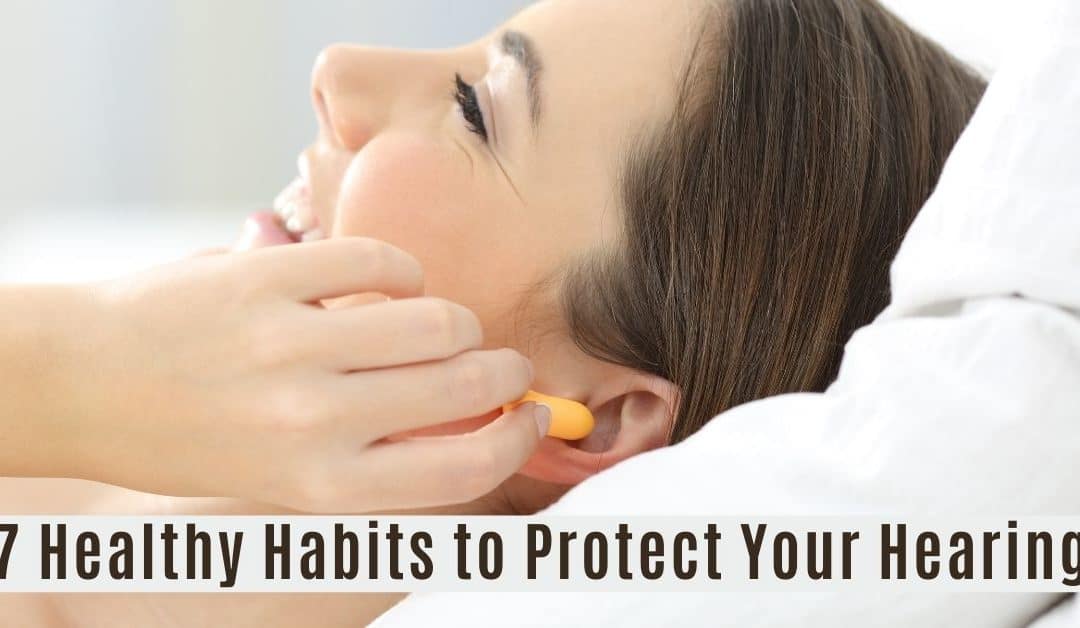Hearing health is just as integral to your holistic wellness as other aspects of health. Hearing loss is one of the most common, chronic, medical conditions in the U.S. Impacting 1 in 8 people, hearing loss is a permanent health reality that can really disrupt your daily life. So being proactive about hearing health can significantly reduce your risk of developing impaired hearing. There are numerous healthy habits you can practice to support the quality and longevity of your hearing. 7 useful tips are:
1. Wear Protective Gear
One time or consistent exposure to loud noise is one of the common causes of hearing loss. According to the Hearing Health Foundation:
- 30 million people are exposed to hazardous levels of noise in the workplace
- 50% of people ages 12-35 are exposed to unsafe levels of noise from use of personal audio devices
These statistics highlight the need to protect your ears from excessive sound. A useful way to do this is by wearing protective gear: earmuffs, earplugs, earbuds, headphones etc. which serve as a protective barrier, reducing the amount of soundwaves you absorb (and their impact).
2. Invest in Noise Cancelling Headphones
Noise cancellation technology is designed to reduce background noise. This prevents you from increasing the volume on audio devices when you are in loud environments, allowing you to listen at safe levels.
3. Maintain Low Volume
Another general tip is to maintain low volume while watching tv, listening to music, podcasts etc. Sound is measured in units referred to as decibels (dB) and noise 85dB and higher is potentially harmful for hearing. We can easily absorb increased levels of sound daily:
- personal audio devices on their loudest setting, can reach 100dB
- household appliances like blenders and hair dryers are around 85dB
- city traffic can also reach 85dB
It is important to be aware of the volume so you can turn it down as needed. A simple way to do this is to download an app to measure the decibels in your environment.
4. Take Listening Breaks
Our auditory system (ears and brain) needs a break from constantly absorbing and processing sound. From the time that we wake up to the time we go to sleep, we are consistently navigating varying levels of noise. It is important to give yourself the space to relax which allows the hair cells in your inner ear to rest and recover. So, power off your devices (or put them on silent mode) and try to rest in a quiet environment.
5. Reduce Exposure to Loud Noise
Reducing your exposure to noise is another helpful way to protect your hearing health. This could include:
- Avoiding traffic during your commute
- Choosing social settings with less background noise (quieter restaurants, bars etc.)
- Being mindful about attending loud events back to back
If your workplace is noisy, you can:
- Ask to be moved to a quieter area
- Place a physical between you and the source of the loud noise
- Speak to your employer about possible workplace accommodations
6. Properly Clean Ears
One of the most common misconceptions about the hygiene of our ears is that you should use a cotton swab to remove earwax. Using cotton swabs is actually not recommended because they can easily push earwax further into the ear which can cause infection. A small amount of earwax is actually good for the ears, helping them stay lubricated. It is important to know that the ears are self-cleaning organs which means earwax naturally exits. If you experience excess earwax you can safely remove by draining the ears with a saline solution or use ear drops to soften the wax (and then drain). Additionally, after swimming, be sure to fully dry your ears to avoid water remaining inside which is a common source of infection.
7. Have Hearing Checked Regularly
In addition to these tips, another healthy habit to practice is having your hearing assessed. Incorporating hearing tests in your annual health screenings is a great way to be proactive. Hearing tests identify any impairment and allow you to intervene and treat any hearing loss. Early intervention can drastically help your transition into better hearing and communication!

